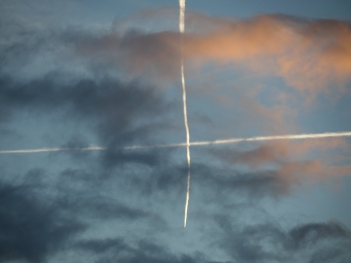One thing that frustrates me when the woo folks have a tale to tell, i.e., some claim of the paranormal that sounds rather fantastical but might be reported to have many witnesses, is the triumphant shout of “How do you explain that?”
It’s an absurd thing to say anyway, of course, because the burden of proof is on those who actually make a claim. I’m not going to waste my time trying to disprove the notion that the US government, say, has alien spaceships hidden in a secret hangar. There might well be former astronauts who make such a claim, but if you are willing to believe their claims on the grounds of who they are, rather than solid evidence (that they always fail to produce), then you are guilty of bad thinking.
The evidence for UFOs – Alien Spaceships From Another Galaxy (ASFAGs as I think they should be called) – is actually non-existent over and above anecdotal accounts. And anecdotes are not evidence. I know that some of the woo promoters insist that anecdotes in the form of personal testimony are allowed as evidence in a court of law, but so what? Personal testimony in court is not accepted at face value; it is going to be challenged and witnesses are going to be subjected to often harsh cross examination and possibly have their credibility destroyed in the light of opposing evidence or even proof. If a witness gives an alibi for a defendant but the defendant’s DNA, fingerprints, and so on are produced to refute that personal testimony, then I think the hard evidence is going to be more compelling than the anecdotal evidence.
What if a defendant’s alibi is that he could not have committed a particular crime because he had been abducted by aliens and he had a dozen witnesses to say they had seen him “beamed” aboard the aliens’ mother ship at the time the alleged crime was committed? I would suggest that any such testimony would be thrown out because such a claim is absurd – although it wouldn’t be classed as absurd if the existence of aliens had already been established. Which it hasn’t.
But here’s a conundrum (for me, at least). I saw my own UFO (ASFAG?) and I can offer only an anecdotal account of the encounter I had. But if you will bear with me, see if you can follow the logic of my narrative.
The striking aspect of my story is that I experienced or witnessed for myself an event that I had often wondered about – witness accounts of UFO sightings where an alleged UFO travels at amazing speed and then suddenly turns at a 90 degree angle and shoots away at equally high speed. OK, it’s easy to criticise the usual blurry photographs purported to be UFOs. It’s easy to criticise UFO claims that have subsequently been debunked. It’s easy to look with a jaundiced eye at former astronauts who rely on their status rather than testable evidence for their UFO claims. But one recurring claim that always troubled me was the alleged 90 degree turn at high speed that often crops up. That’s not so easy to dismiss as a light in the sky that could be almost anything.
Anyway, the scenario was this: I live on the North East coast of England, and I regularly drive along a road that runs approximately parallel with the coast. The road itself is about 1.5 miles long between two main junctions, and at night is very dark except for about four pedestrian crossing points that each have a couple of street lamps on either side of the road. Apart from that, the entire road is just complete darkness for night time driving, and the use of headlights is essential. Although the road edges can be seen in the glow of one’s headlights, anything further than the far kerb is just complete blackness. The only occasional sign of life might be the lights from a ship out at sea. But this night, there was not even that.
This is a photograph of what can be seen in normal daylight, but keep in mind the fact that after sunset there is just complete blackness beyond the kerb you can see in the picture.

The road itself is one I have driven along thousands of times in almost forty years of driving, at various times of the day and night. It is almost always an uneventful drive except for this particular night: from the corner of my eye I saw a vaguely orange light shoot straight up in the air, and as I turned to look at it, it turned at 90 degrees and shot away at high speed in the opposite direction from my own line of travel.
I saw this out in the blackness that would have had to be the sea, and although I wondered at first if it could have been a distress flare perhaps from a fishing boat in trouble, it was immediately obvious that a flare would not have done such a sharp turn and headed out of sight at such high speed. Even if there had been a heavy wind, I would have expected it to curve through the air, not turn and shoot off.
But just as I was pondering the improbability of me having discovered an underwater alien base, it happened again! Another light shot up in the air and again did a 90 degree turn, again shooting away into the distance. This was just getting too weird for a sceptic like me.
When I reached the end of the road, I turned the car around and headed back – obviously keeping a keen eye on the seaward side. But this time – nothing.
Never mind, once I had returned to the original junction, I set back off in the original direction I was headed (north). Again – nothing.
This was more than just a little bit irritating because (dare I say it?) I know what I saw. But to be honest, what I saw (twice) was a light shoot upwards, turn 90 degrees and then shoot away at apparently high speed. I’m not going to claim I saw an alien space ship. I still wanted to know what it was, however, and I was determined to at least try to solve this awkward riddle.
As I headed north for the third time, I realised that the time difference between my first and second sightings (maybe about eight seconds) was approximately the same time it took to travel between two of the pedestrian crossing areas with their attendant street lights.
I had noticed a correlation, but beware – any statistician can tell you that a correlation does not imply a causal link, although it’s true to say that if there is a causal link there will always be a correlation. So what next?
I did what any competent researcher does – I put together every salient fact I could think of and I tried to form a hypothesis that would explain what had happened.
The main facts were these:
-
It was a dark night.
-
The effect happened when I passed under street lights.
-
It was raining lightly.
-
My car window was partially open at the time of the sightings.
-
The local council had recently installed new lamp posts.
Given the fact that I have travelled the same route thousands of times over the best part of four decades, at all times of the day or night in all kinds of weather, one thing was different this time – the new street lights. Could that have something to do with it?
Being the inquisitive person I am, someone who loves puzzles but hates mysteries, I really had to get to the bottom of this, and I drove back and forth along that stretch of road until I found what was at least a tentative answer. Maybe nine or ten times up and down the same road. But – Eureka! Here’s what happened that night, and over several following weeks of testing and retesting:
My habit, as I drive around town, is to drive with my window slightly open – just a gap of a couple of inches for a flow of fresh air. Even during light rain, that’s OK unless the rain is heavy enough to come into the car, in which case I drive with the window closed.
On this particular night, there was light rain and my window was slightly open as usual. If my memory was correct, then each time I had seen this mysterious UFO was just as I passed by one of the sets of street lights.
I also realised that the local council had recently been undertaking a programme of street light renewal. These particular lights were new and, unlike the old lights, are taller and the lights themselves are set at the top each lamp post rather than on an arm that extended over the road itself.
I wondered if it was possible that the angle of the lights in relation to the car window might be something to do with this strange phenomenon. So I drove back and forth until the exact effect happened again. And it turned out that with my window at a particular height, the effect could be reproduced, There was no end of UFOs that night. It seemed that the UFO effect was caused by light from the streetlights reflecting from the edge of the car window: one point of light travelling up the sloping lead edge of the window giving the impression of a light travelling vertically, and then travelling over the rising top of the window giving the impression of the light suddenly travelling horizontally.
Problem solved? Not quite.
Reproducing an experiment once or twice is hardly conclusive, so I repeated the drive a couple of nights later. Alas, nothing happened, even though I did the same run – back and forth – several times, and trying the window at different heights. Nothing.
Maybe the rain had something to do with it? I had to wait a week or two for more rain and set out again. This time – success! More UFOs!
And during the following weeks I did the same thing. Clear nights, rainy nights. On the clear nights nothing, whatever height I set the window. On very rainy nights, nothing, whatever the height of the window. But on nights with a light rain, and with the window set to a particular height, the effect of a UFO taking off vertically and shooting away horizontally could be easily reproduced.
I think I solved the problem: the effect was produced because of light rain forming a bead of water on the leading edge of the window, and that was where the light from the street lamps focused and reflected into my peripheral vision, causing what was nothing more than an optical illusion. When it happened, it was momentary and fleeting – but absolutely startling. If I had already been a believer in UFOs, I’m sure I would have been convinced that I had had a close encounter, and might possibly have contacted the press to make such a claim.
The reality is rather mundane: it all came down to a particular set of conditions that had to come together by chance. Consider what was involved:
-
New street lights that were taller than the previous lights.
-
The lamps attached to them were close in to the lamp posts rather than extended over the road.
-
There was a light rain.
-
My car window happened to be at a particular height.
-
The rain had formed a bead of water on the edge of the glass.
-
The light from the streetlights had been refracted through that bead of water as I passed by them.
-
The effect as it happened lasted only a very small fraction of a second.
At that moment, I really thought I had witnessed a light out at sea shoot vertically upwards and then turn at 90 degrees and shoot away.
I think most people would not have gone much further than the original observation, and perhaps some of them would be making a song and dance about it. It is, after all, a staple of the UFO community – something strange is observed and – wait for it – it can’t be explained! Ta-Daaaaa! And as any believer can tell you, if it can’t be explained, then it must be [insert preferred woo here].
Yes, indeed, how do you explain that? Actually, you go out and investigate it.
I spent time over several weeks investigating this strange event, but I think it was worth it – at least to satisfy my own curiosity. Admittedly, my investigation into what happened doesn’t satisfy the criteria needed for publication in a scientific journal, but at least I followed some basic rules of research and I was able to eliminate some possible explanations until I came to a conclusion that is reasonable and is consistent with the known laws of physics (and optics, especially).
If only the promoters of the paranormal would do something similar in their everyday lives. It’s just too easy, however, to observe an event that appears anomalous and then just assume it is paranormal because it happens to fit neatly with existing beliefs.
Is there a moral to this story? Maybe. Believers in paranormal phenomena tend to accept claims of the paranormal at face value. A paranormal claim becomes a paranormal fact for them, and sceptical objections are dismissed as “just so stories” from nay-saying curmudgeons. The believers seem to be so committed to their beliefs, however, that possible explanations offered by sceptical critics must be swept away. Quite honestly, though, I still chuckle inwardly when I recall one of my correspondents calling me “deluded” for “not being broad minded enough” to believe. Quite. Silly me for preferring quantifiable reality to unsubstantiated claims that no one can demonstrate to be fact.
As I said earlier, the claim of UFOs shooting in one direction and then turning at 90 degrees in an instant and flying off at equally high speed was something that puzzled me for some time. It’s not so easy to explain as just pointing out that a blurred smudge on an out of focus photograph is not proof of alien visitation – and of course the believers still think that the onus is somehow on sceptics to disprove paranormal claims rather than they themselves having any obligation to prove the anti-scientific claims they promote.
The bottom line is this: I actually experienced a phenomenon that seemed unlikely, even though there are numerous eyewitness reports of “UFOs” doing high speed manoeuvres that seem to defy the laws of physics. It isn’t something for which a possible explanation is easily available. Even if you want to postulate an optical illusion of some kind, that’s not much to work on unless you can offer a plausible scenario. Without knowing the exact circumstances of any particular claim, you can’t really say much about it.
In my particular case, however, I can say with some confidence that what I experienced was, indeed, an optical illusion. It was an illusion that was so startling and real at the time that I was momentarily stunned, and in that moment I thought of other accounts I had read about from UFO believers, and I think I can understand why some people would think they had had an extraterrestrial encounter.
But, the question is this: if you have an unusual experience, should you assume an answer that fits your beliefs, or do you try to find out what is really going on?
I’ve said it before and I’ll say it again: it would be cool if the existence of anything paranormal could be confirmed, and I would not object to it at all. But the confirmable evidence needs to be there. Prove that alien space ships are real, and even I will accept the possibility of alien abduction as a plausible alibi in a court of law.
Until then, I remain sceptical. In the case of UFOs claimed to be travelling at high speed and turning instantly at 90 degrees, I think the first question anyone should ask is, “Were there any reflective surfaces nearby?” Even reflections in a pair of spectacles might provide a possible answer to some alleged UFO sightings. It’s worth thinking about before assuming an answer for which there is no credible evidence.
Additional Note:
This is a genuine photograph I took when I was testing out my new smart phone thingy in January this year. This is the picture, with no “photoshopped” special effects added, no digital photo manipulation, just a cropped section of a picture that was recorded when I took the photo. I was looking at the moon, among other things, when this hove into view. If any UFO experts want to tell me what it is, I will be happy to publish all analyses.

I have my own hypothesis, but should I leave it up to the UFO “experts” to decide? Should I send it off for “expert analysis” and see if there are any “startling results” to follow? Are there any local “photo analysts” that can help me?
I will post my own ideas about it in the comments in a couple of days.




















